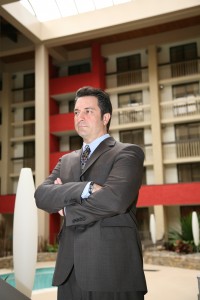
In an economy that has drained revenue and jobs from both public and private sectors, Westchester County”™s hotel industry has hung out a ”˜Do not tax”™ sign for local municipalities and their backers in Albany.
“We are in an economic time that every penny counts to the customer,” said Dan Conte, general manager of the Westchester Marriott in Tarrytown and president of the Westchester Hotel Association. “At the end of the day, everything counts, especially when the economy is what it is right now.”
Conte heads a countywide group of 31 hotels, inns and conference centers that recently stated its “strong opposition” to a 3 percent room occupancy tax proposed for the town of Greenburgh and its six villages.
The local room tax also is sought by the village of Mamaroneck, where two small motels would be affected, according to the hotel association. The taxing authority, which requires an act of the state Legislature, is favored by a growing number of Westchester towns and villages as a means to raise revenue without raising property taxes.
An alternate source of revenue
That move in Westchester to what has been called an “exportable” tax began with the city of Rye in 2006, followed in 2009 by the cities of New Rochelle and White Plains, which reportedly collected $256,000 and $920,000, respectively, from hotel operators last year.
The trend has accelerated since Rye Brook in 2010 became the first village in the state to implement an occupancy tax. Rye Brook officials expect to generate more than $400,000 annually from approximately 800 rooms at the Doral Arrowwood Hotel Conference Center and Hilton Rye Town.
For Greenburgh, revenue from the hotel tax in the town”™s unincorporated area “would be at least in the six figures,” said Town Supervisor Paul Feiner. “This could be like 1 percent off the (property) tax hike.”
A bill introduced by Assemblyman Thomas J. Abinanti, D-92nd District, authorizes Greenburgh and villages within its borders to enact the hotel and motel tax. Feiner said Sen. Andrea Stewart-Cousins, D-35th District, will introduce the bill in the state Senate. The supervisor hopes the bill will be approved in the current legislative session, after which the town board can adopt the tax measure.
Abinanti, in justifying his sponsored bill, stated, “Particularly during these difficult economic times, municipalities need additional non-property tax sources of revenue to fund the basic services to keep their communities safe and properly serviced.”
Opposing the alternate tax, the Westchester Hotel Association called on state legislators “to avoid the temptation to add to the tax burden we are already carrying.”
Abinanti could not be reached for comment on prospects for passage of the bill, which was referred to the Assembly Ways and Means Committee.
Season off to a slow start
Conte said hotels are “easy prey” for public administrators and elected officials, who have “isolated” the industry with the new tax. “With the hospitality industry, we”™re not always considered a vital part of the economy” nor a complaining voter bloc, he said.
“What they apparently fail to see is that we are one of the largest sectors in the Westchester economy.” Conte said the association”™s 31 members account for 5,340 guest rooms and employ more than 2,500 workers.
In the last three years, the county”™s hotel operators have cut their workforce by 20 percent to 30 percent “because our revenues aren”™t there,” said Conte. At the Westchester Marriott, the general manager said employment is down at least 30 percent.
After a two-year industrywide slump in business travel and corporate meetings, a better market was forecast for 2011. Perhaps due to the severe winter, revolutions and uprisings in the Middle East and natural and nuclear disasters in Japan, said Conte, “It”™s been a slow start” to the anticipated year. “We”™re still not as strong as we like.”
The hotel group noted a local room occupancy tax, when added to the county hotel tax and state and local sales taxes, would bring the total room tax for guests throughout the county to more than 10 percent. For the dozen hotels and motels in Greenburgh, the total tax would be nearly 14 percent of a guest”™s room rate.
Tax could hurt competitive position
Conte noted the planned tax could weigh decisively against Westchester hotels like his that bid for business in a crowded tristate metropolitan market.
“Adding another tax only serves to undercut our competitive position,” he said. “It is a short-sighted approach that may seem like an easy financial hit for the local municipalities, but it is anti-business.”
In Greenburgh, Feiner in the last year has pushed town officials to adopt a more “pro-business” approach that attracts business tenants and serves to build the town”™s commercial property tax base. He said he invited Conte to meet to discuss initiatives to promote its hotels and motels on the town website and cast Greenburgh as a tourist destination.
Conte said he and the hotel association”™s vice president, David Leftwich, general manager of the IBM Learning Center in Armonk, will sit down with Feiner.
Conte said the growing municipal push for a new commercial tax runs counter to the work and focus of county groups such as the Business Council of Westchester”™s business development coalition, on which he serves.
“It”™s hard to sit here in a market and say, let”™s create jobs, let”™s bring business to the county ”“ and let”™s raise taxes. It doesn”™t seem like the left hand is talking to the right hand,” he said.
















